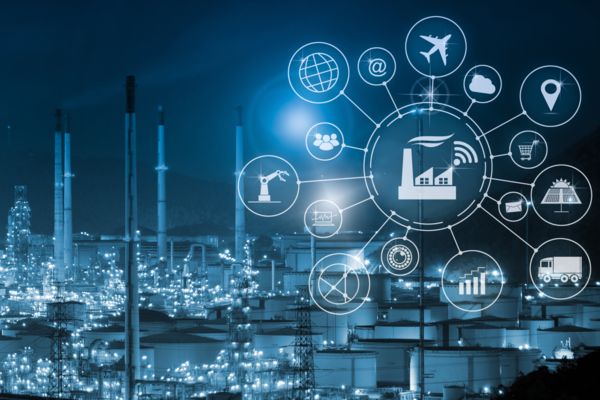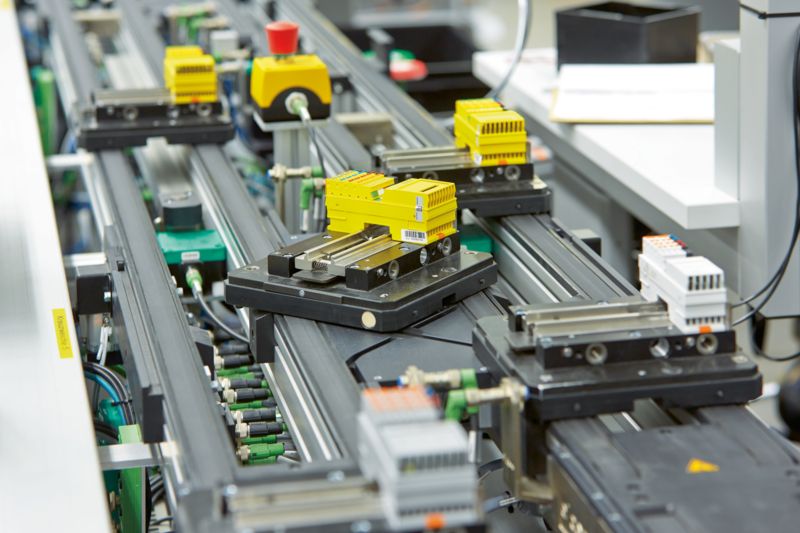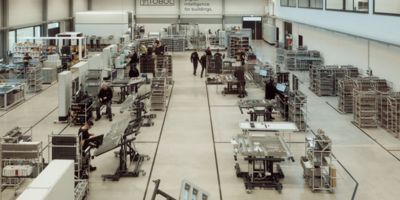What is Industry 4.0? Industry 4.0 describes the digital transformation of industry. Find out how IoT, AI, and big data can optimize production and increase flexibility.

Brief summary
Industry 4.0, the fourth industrial revolution, describes the digital transformation in production. The latest information and communication technologies such as IoT (networking machines and devices), artificial intelligence, and big data (processing large amounts of data) make production processes more intelligent and networked. Companies can respond more quickly to market conditions, optimize processes, reduce costs, and improve product quality.

Opportunities for companies
Companies can use Industry 4.0 technologies to improve there production and business processes. IoT sensors provide real-time data on the state of machinery and manufacturing processes, optimize maintenance schedules, and prevent failures. AI supports automated decisions through pattern recognition in large amounts of data. Cloud-based platforms enable seamless collaboration and increased data security. Big data analyses improve market forecasts and promote innovation. Companies can adapt more flexibly to customer needs and implement new business models so that they can achieve competitive advantages.

Industry 4.0 application fields
- Smart Factory: Automated and networked production systems
- Predictive maintenance: Predictive maintenance that minimizes maintenance requirements
- Supply chain management: Real-time monitoring and optimization of the supply chain for more efficient processes
- Mass customization: Flexible production to meet individual customer requirements cost-effectively
- Internet of Things (IoT): Networking machines and devices
- Cyber-physical systems: Integrating physical and digital systems to improve production processes
- Augmented Reality (AR): Support of maintenance and repair work through the virtual extension of digital elements
- Big data analytics: Using large amounts of data to optimize production processes and decision-making

Digital twins in Industry 4.0
Digital twins play a central role in Industry 4.0 because they bridge the gap between the physical and digital worlds. They enable precise real-time monitoring and analysis of machines, systems, and processes, resulting in improved efficiency and predictive maintenance.
By using simulations and virtual prototypes, companies can optimize their production processes and develop new products faster and more cost-effectively. Overall, digital twins contribute to increasing the quality and reliability of products, reducing operating costs, and promoting innovation.
Opportunities of Industry 4.0
- Increased efficiency: By automating and networking production processes, companies can significantly increase their efficiency and reduce costs.
- Flexibility: Industry 4.0 enables flexible production that can be quickly adapted to changing market requirements and individual customer requirements.
- Innovations: New technologies such as the Internet of Things (IoT), Artificial Intelligence (AI), and big data analytics promote innovation and open up new business fields.
- Sustainability: With the optimized use of resources and energy-efficient processes, companies can operate in a more environmentally friendly way.
Challenges of Industry 4.0
- Data security: Increased networking and digitalization increases the risk of cyberattacks and requires robust security measures.
- Employee qualifications: The introduction of new technologies requires well-trained specialists and continuous employee training.
- Investment costs: The switch to Industry 4.0 requires significant investments in new technologies and infrastructure.
- Complexity: The integration and management of the various systems and technologies can be complex and time-consuming.

Industry 4.0 at Phoenix Contact
We are actively shaping solutions for the future together with our customers and partners. With our many years of experience in machine building and automation, we are ideally placed to take the digital transformation of our world and turn it into the intelligent production of tomorrow. Here, extensive manufacturing capability, in-house machine building, and expert automation know-how are just three of the many reasons why Phoenix Contact is a reliable partner.
Summary and outlook
Industry 4.0 marks the beginning of a new chapter in industrial development with far-reaching effects on production. The transformation promises to increase efficiency considerably through networked and automated systems that develop intelligent and adaptive processes.
Companies can remain competitive and establish themselves as pioneers in innovation and sustainability. This requires strategic planning and investment, in particular in employee training and cybersecurity. Success depends on integrating employees as a central part of this technological evolution and on maintaining the balance between humans and machines.
Connect with our experts

More posts

More control cabinets with efficiency
TOBOL, a building automation company and switchgear manufacturer, is using the consulting services of Phoenix Contact to position itself ready for the future of switchgear manufacturing.

The All Electric Society – how sector coupling works
Flexibility with a battery storage system and energy management.

What is a digital twin?
Digital twins are virtual models that can be used to better understand, test, and optimize processes.



